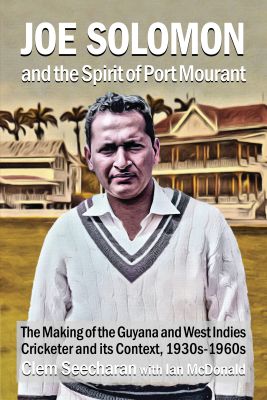This tribute to Joe Solomon (1930-), now the oldest West Indies Test cricketer, celebrates the career 'and its context' of this reliable lower middle order batsman on his 92nd birthday. Solomon is from Port Mourant, an exceptional sugar plantation on the Corentyne Coast in Guyana (formerly British Guiana), birthplace of the Guyanese leader Cheddi Jagan (1918-97), as well as several other Test cricketers: John Trim, Rohan Kanhai, Basil Butcher, Ivan Madray and Alvin Kallicharran. Solomon played in 14 of the 15 Tests led by the first black captain of the West Indies, Sir Frank Worrell (1924-67), between 1960 and 1963. Worrell's teams rekindled passion widely for a game that had become stodgy in the late 1950s. Though less flamboyant, Joe was the even-tempered stabiliser in a team of gifted, if mercurial, stroke-makers. In December 1960, Solomon executed two run outs, direct hits when Australia was on the verge of victory, that were instrumental in effecting the first Tied Test in the history of cricket. The style and sportsmanship of Worrell's team, in 1960-1, so captivated the Australian imagination that over 300,000 poured into the streets of Melbourne, on 17 February 1961, to say farewell to the West Indians. Joe Solomon will be remembered eternally for that Tied Test in Brisbane in December 1960; but, as Ian McDonald reminds us, 'over and over again, Joe walked to the wicket with everyone in the nation depending on him to save the day'. This book examines the private and wider social forces that made Joe the epitome of the qualities Worrell inculcated in his players: application, control of the emotions, fidelity to the traditions of the noble game, team spirit and an appreciation that West Indians expected their cricketers to be exemplary ambassadors, within and beyond the boundary.

